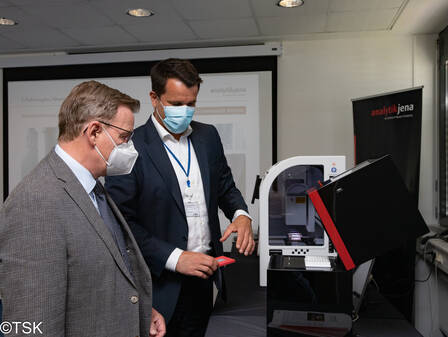Wastewater is a source of information
Thuringia’s Minister President Ramelow at Presentation on Tests for Viruses in Wastewater
Jena, 31 May 2021 – Bodo Ramelow, Minister President of the State of Thuringia, visited Analytik Jena GmbH on Monday for a presentation on the potential of wastewater for use in epidemiology. For SARS-CoV-2 and beyond, wastewater at sewage treatment plants can provide data, similar to indirect mass tests, that can lead to conclusions on the health of the local population. The presentation touched on the technology as well as initial thoughts on a joint project proposal by Weimar’s Bauhaus University and Analytik Jena GmbH, with the goal of researching the potential for a state-wide monitoring system. The initiative follows on the visit to Analytik Jena by Wolfgang Tiefensee, Thuringia’s Minister of Economy and Science, together with the Managing Director of the State Development Corporation of Thuringia, Andreas Krey, on 31 March 2021.
In the words of Dr. Silvio Beier, Professor of Technologies for Urban Material Flow Use at the Bauhaus University of Weimar: “The pandemic has demonstrated the great potential for wastewater monitoring in health-related applications. The topic of water and health is central to our quality of life, today and for future generations. Innovative approaches are required here such as wastewater-based epidemiology. We need to research the possibilities and limitations of wastewater data and establish standards for it today. Thuringia can provide the necessary competence for this in its research and industry.”
Viral particles can be detected in wastewater above a certain level of concentration. Detecting SARS-CoV-2 in wastewater is a priority as the means for an early warning system. Wastewater samples can serve as mass areal tests to indicate sources of infection, hotspots, and unreported cases. Solid data on infection developments allow for more purposeful heath policies when it comes, for example, to making decisions on lockdowns. As Analytik Jena project manager Dr. Robert Möller explained: “The process can be expanded to trace the spread of other pathogens in the population, including gastrointestinal germs, influenza viruses, and antibiotic-resistant bacteria. Further biological parameters are conceivable as well.”
Obtaining information on individuals is not possible using mass tests, which also means that personal data rights cannot be infringed. Relatedly, the system does not depend on the willingness of individuals to participate voluntarily, as is the case with related apps, which are therefore not able to arrive at a picture of the entire population. Wastewater monitoring, moreover, constitutes a further process in addition to previous testing variants, and one which provides great use at little cost towards arriving at a full picture of the situation.
As Minister President Bodo Ramelow reflected: “The proper use of suitable technologies in our daily lives can be a significant component when it comes to fighting pandemics and shaping our lives under the threat of viruses. The pro.vention trade fair in Erfurt will once again be dedicated to this topic in July. I am very happy that Thuringia has had numerous initiatives in this area. The joint efforts by Analytik Jena and the Bauhaus University of Weimar towards detecting viral last in wastewater can be an important contribution towards continuing to improve on pandemic management.”
“It was inconceivable, only a few years ago, to extract detailed genetic information from difficult samples such as wastewater,” Analytik Jena product manager Dr. Christine Gräfe explained. “But the life sciences have been developing rapidly and we can now meet all the requirements with our equipment.”
Analytik Jena GmbH developed this process, together with its Swiss-based parent company Endress+Hauser, and now can provide the entire process chain from the sampling and sample preconcentration to nucleic acid extraction and PCR detection. This is based on the same polymerase chain reaction (PCR) used in clinical tests. The polymerase enzyme is used to replicate DNA sequences, which is generated from RNA in the case of viruses. The processes function automatically, starting with the sampling stage. This begins with a sampler provided by Endress+Hauser. Analytik Jena’s CyBio FeliX system carries out the subsequent steps. As Manuela Beil-Peter clarified: “It is a pipetting robot that we can use to fully automatically prepare samples. Small volumes are transferred with precision in high-density formats and arranged on microplates, all in large quantities.”
To sequence the genetic material, kits are used that contain all of the biochemicals needed to for detection: The polymerase enzyme, the sequence-specific primer, which detects a typical sequence in the sample, and puffer reagents.
The polymerase chain-reaction follows certain temperature cycles. “They take place in Analytik Jena’s qTOWER³ automatically and with precision,” Melanie Kelm, Head of Product Management, specified. In the real-time PCR process, the targeted replicated sequence is given a fluorescent marking. The more frequently the sequence appears, the stronger it glows, and the clearer the actual level of the viral load becomes.
With its automated solutions for genetic material analysis, covering the entire workflow, Analytik Jena has seen significant growth in the area since the pandemic began. As CEO Ulrich Krauss outlined: “We will continue to invest here and, as a company, we are proud that our solutions contribute towards bringing the current pandemic under control and being able to get ahead of similar future events with an effective early warning and monitoring system.”
Contacts:
Jana Dichelle | Corporate Communications | Telephone: +49 176 17777010 | jana.dichelle@analytik-jena.comMelanie Kelm | Head of Product Management | Telephone : +49 3641 77 9461 | melanie.kelm@analytik-jena.com

Thuringian Minister President Bodo Ramelow, Dr. Robert Möller (Analytik Jena GmbH) and a qTOWER (from left).


